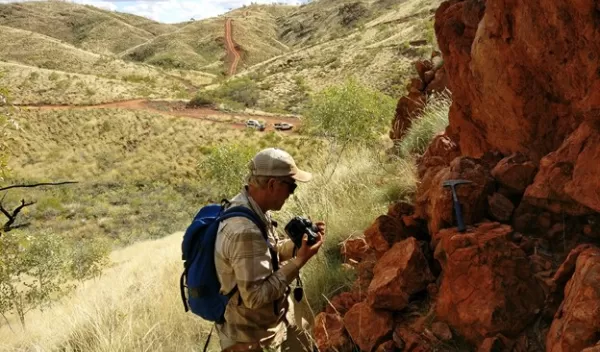
Scientists determine early Earth was a ‘water world’ by studying exposed ocean crust
The Earth of 3.2 billion years ago was a "water world" of submerged continents, geologists say, after analyzing oxygen isotope data from ancient ocean crust now exposed on land in Australia. The finding could have major implications for the origin of life on Earth.
"An early Earth without emergent continents may have resembled a 'water world,' providing an important environmental constraint on the origin and evolution of life on Earth as well as its possible existence elsewhere," geoscientists Benjamin Johnson and Boswell Wing write in a paper published in the journal Nature Geoscience.
Johnson is at Iowa State University; Wing is at the University of Colorado Boulder. Funding from the National Science Foundation supported their study.
Johnson said his work on the project started when he talked with Wing and learned about the well-preserved, 3.2-billion-year-old ocean crust from the Archaean eon (4 billion to 2.5 billion years ago) in a remote part of Western Australia. He conducted the research during his NSF Division of Earth Sciences-supported postdoctoral work at the University of Colorado Boulder.
After taking rock samples and digging into the library of existing data, Johnson created a cross-section grid of the oxygen isotope and temperature values found in the rock.
Once he had two-dimensional grids based on whole-rock data, he created an inverse model to come up with estimates of the oxygen isotopes within the ancient oceans. The result: Ancient seawater was enriched with about 4 parts per thousand more of a heavy Isotope of oxygen than an ice-free ocean of today.
How to explain that decrease in heavy isotopes over time? Johnson and Wing suggest two possible ways. Water cycling through the ancient ocean crust was different than today's seawater, with much more high-temperature interactions that could have enriched the ocean with the heavy isotopes of oxygen. Or, water cycling from continental rock could have reduced the percentage of heavy isotopes in ocean water.
"The 3.2-billion-year-old section of ocean crust we studied looks exactly like much, much younger ocean crust," Johnson said. The models inform us about the environment where life originated and evolved. "Without continents and land above sea level," said Johnson, "the only place for the very first ecosystems to evolve would have been in the ocean."
"The topic of the isotopic composition of seawater over geologic time has been much discussed, and this study has added critical data to this debate and to that of the emergence of plate tectonics as we know it today," said Enriqueta Barrera, a program director in NSF's Division of Earth Sciences.


